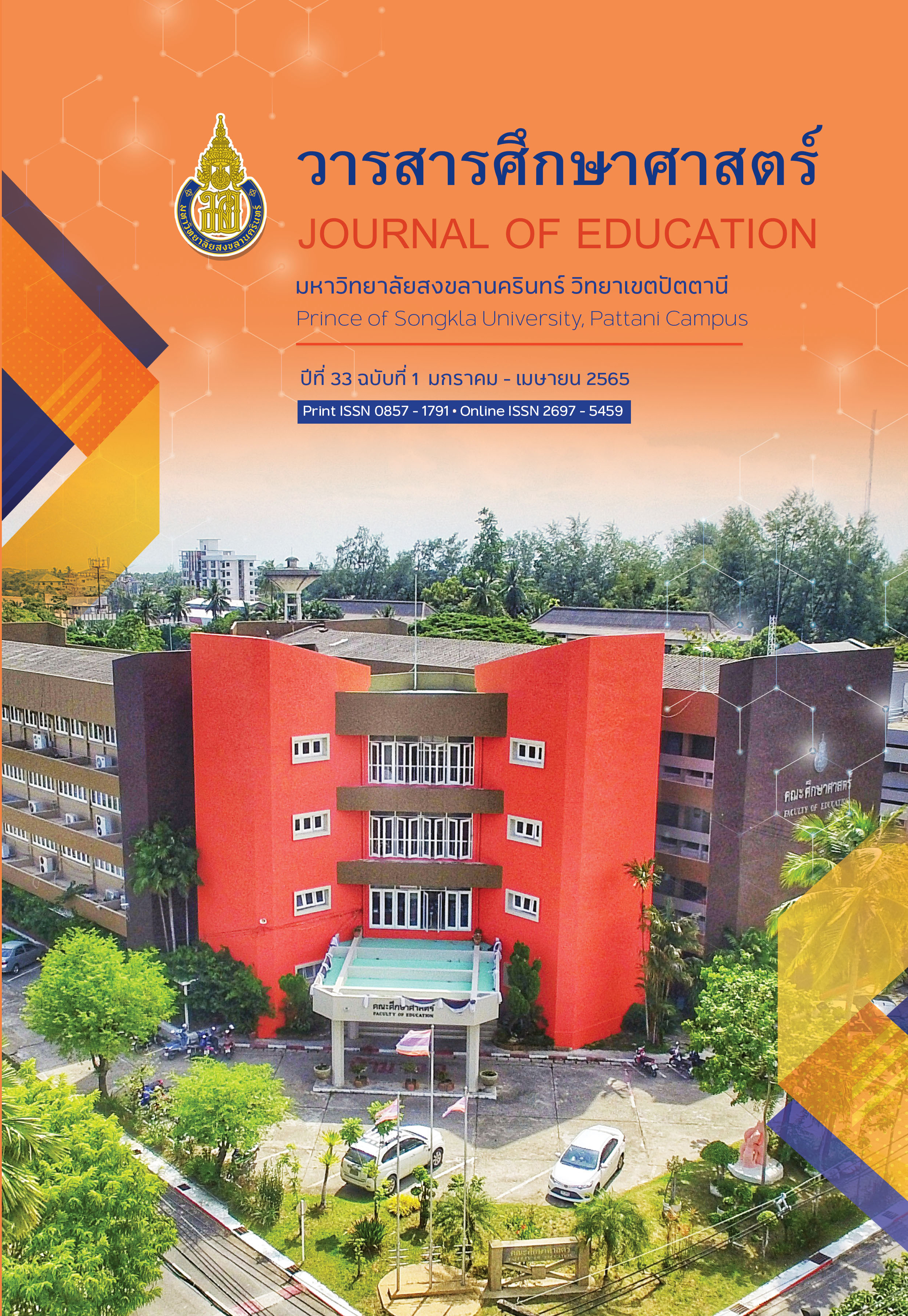การพัฒนารูปแบบสมรรถนะจัดการเรียนรู้ในศตวรรษที่ 21 ที่ส่งผลต่อคุณภาพผู้เรียน ตามแนวปฏิรูปการศึกษาและวิสัยทัศน์เชิงนโยบายประเทศไทย 4.0 ของครูในจังหวัดสุราษฎร์ธานี
Main Article Content
บทคัดย่อ
ในการศึกษาครั้งนี้มีวัตถุประสงค์เพื่อสังเคราะห์องค์ประกอบ ตัวชี้วัด และรูปแบบสมรรถนะจัดการเรียนรู้แห่งศตวรรษที่ 21 ที่ส่งผลต่อคุณภาพผู้เรียน รวมทั้งตรวจสอบความเที่ยงตรงของรูปแบบที่สร้างและพัฒนาขึ้นกับข้อมูลเชิงประจักษ์ โดยใช้การวิจัยแบบผสานวิธี ได้แก่ การสังเคราะห์งานวิจัย การสัมภาษณ์และการประชุมกลุ่ม รวมทั้งการวิเคราะห์รูปแบบสมการโครงสร้าง กลุ่มที่ศึกษา ได้แก่ รายงานวิจัย 260 เรื่อง ครูในจังหวัดสุราษฎร์ธานีเป็นผู้ให้ข้อมูลหลัก 48 คนและตัวอย่าง 354 คน เครื่องมือวิจัย ได้แก่ แบบบันทึกสาระสำคัญรายงานวิจัย แบบสัมภาษณ์ แบบบันทึกการประชุม และแบบสอบถามความคิดเห็นของครูที่มีต่อสมรรถนะจัดการเรียนรู้ที่ส่งผลต่อคุณภาพของผู้เรียน รวมทั้งในการวิเคราะห์ข้อมูลโดยวิเคราะห์เชิงเนื้อหาและวิเคราะห์รูปแบบสมการโครงสร้าง ผลการวิจัยมีดังนี้ รูปแบบสมรรถนะจัดการเรียนรู้แห่งศตวรรษที่ 21 ที่ส่งผลต่อคุณภาพของผู้เรียน มีองค์ประกอบ 4 ด้าน 13 ตัวชี้วัด ได้แก่ 1) ความรู้มี 2 ตัวชี้วัดคือ วิชาชีพและการจัดเนื้อหาสาระ 2) บุคลิกลักษณะมี 2 ตัวชี้วัดคือ บุคลิกภาพครูและเจตคติที่มีต่อวิชาชีพครู 3) บริหารจัดการเรียนรู้มี 6 ตัวชี้วัดคือ วิเคราะห์ผู้เรียน ออกแบบ เตรียมจัดการ จัดกระบวนการ ประเมินผล และปรับปรุงแก้ไขวิจัยพัฒนา และ 4) คุณภาพผู้เรียนมี 3 ตัวชี้วัดคือ ผลสัมฤทธิ์ พัฒนาการ และทักษะการเรียนรู้ “3R8C” โดยเป็นรูปแบบความสัมพันธ์เชิงสาเหตุของตัวแปรแฝงภายในคุณภาพผู้เรียน 1 ตัวซึ่งมีตัวแปรสังเกตได้ 3 ตัวแปร ตัวแปรปัจจัยเชิงสาเหตุ 3 ปัจจัยซึ่งมีตัวแปรสังเกตได้ 10 ตัวแปรและเส้นโยงอิทธิพล 5 เส้น รวมทั้งโมเดลการวิจัยมีความสอดคล้องกลมกลืนกับข้อมูลเชิงประจักษ์ โดยตัวแปรในโมเดลสามารถอธิบายความแปรปรวนร่วมในตัวแปรแฝงด้านคุณภาพของผู้เรียนได้ร้อยละ 97
Article Details

อนุญาตภายใต้เงื่อนไข Creative Commons Attribution-NonCommercial 4.0 International License.
เอกสารอ้างอิง
Buasonte, R. (2016). A Mixed Method for Research and Evaluation. Bangkok: Chulalongkorn University Press. [in Thai]
Bureau of Educational Testing. (2018). Educational Quality Assessment Handbook for External Appraisers. Office of the Basic Education Commission, pp. 5-7, 25-29. [in Thai]
Campbell, D. (2000). Authentic Assessment and Authentic Standards. Phi Delta Kappan, 81(5) 405-407.
Cheng Y. C. & Tsui K. T. (1998). Research on total teacher effectiveness: conception and strategies. International Journal of Educational Management, 12(1), 39-47.
Dachakupt, P. and Yindeesuk, P. (2016). 21th Century Learning Management. (4th Ed). Bangkok: Chulalongkorn University Press. [in Thai]
Kanjanawasee, S. (2004). Learner-centered Instruction. Department of Educational Research, Faculty of Education, Chulalongkorn University. [in Thai]
Khammanee, T. (2017). Teaching science. (21th Edition). Bangkok: Chulalongkorn University Press. [in Thai]
Medley, D. M. (1977). Teacher Competence and Teacher Effectiveness: A Review of Process-Product Research. The American Association of Colleges for Teacher Education. Office of Education (DHEW), Washington, D.C.
Ministry of Education. (2008). The Basic Education Core Curriculum B.E. 2551 (A.D. 2008). Bangkok: Office of the Basic Education Commission, The Ministry of Education. [in Thai]
Office of the Education Council. (2007). Report on the synthesis of situations and factors affecting the quality of Thai education. Bangkok: VTC Communication. [in Thai]
Office of the National Education Commission. (2002). National Education Act 1999 and Amendments (Version 2) 2002. Bangkok: Phrik-Hwan Graphic. [in Thai]
Office of the Secondary Education Service Area. (2017). Driving Thai Secondary Education 4.0 for Employment in the 21st Century. Office of the Basic Education Commission, Ministry of Education. Bangkok: The Agricultural Cooperative Association of Thailand Co., Ltd. [in Thai]
Office of the Teacher Civil Service and Educational Personnel Commission (OTEPC). (2017). Criteria and methods for teacher civil service and educational personnel, teacher positions with academic qualifications and academic promotion. Books of OTEPC. 0206.3/Wor 21 dated, 5 July 2017. [in Thai]
Panich, W. (2012). How to create learning for pupils in the 21th century. Bangkok: Sodsri-Saritwong Foundation. [in Thai]
Passos, A. (2009). A Comparative Analysis of Teacher Competence and Its Effect on Pupil Performance in Upper Primary Schools in Mozambique and other SACMEQ countries. [Doctoral Dissertation, University of Pretoria].
Prasertcharoensuk, T., Kanokorn, S., & Keow Ngang, T. (2017). Teachers’ Organizational Citizenship Behaviour: A Causal Relationship Model. Contemporary Educational Researches Journal, 7(1), 2-10.
Secretariat Office of the Teachers Council of Thailand. (2019). Educational Profession Standards. Bangkok: Secretariat Office of the Teachers Council of Thailand, Ministry of Education. [in Thai]
Shulman, L.S. (1986). Those Who Understand: Knowledge Growth in Teaching. Educational Researcher, 15(2), 4-14.
Teachers Council of Thailand Regulations on Professional Standards (Issue 4) B.E. 2562. (2019, 20 March). Royal Thai Government Gazette. Rule Number 136, Section Number 68 ngor, p.18-21. [in Thai]
Thongkanluang, S. (2014). Model of Competency Evaluation in Learning Management at Basic Education Level for Student Teachers of Rajabhat Universities. [Doctoral Dissertation, Chiang Mai University].
Westera, W. (2001). Competences in Education: a confusion of tongues. Journal of Curriculum Studies, 33(1), 75-88.
Wijitwanna, S. (2004). The Evaluation of Teachers’ Learning Management. Educational Evaluation Journal. 2, 38-55. [in Thai]
Wiratchai, N. (2005). Research Trends in The Knowledge Society Era. Journal of Educational Administration, Khon Kaen University. 1(2), 9-18. [in Thai]


